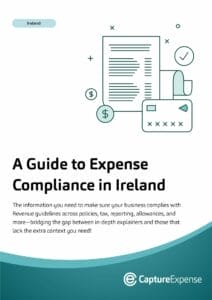Do you know how to make a subsistence allowance claim? Are you familiar with the day and overnight allowance rates in Ireland? If you’re struggling with the civil service subsistence rates, you’re not alone.
But don’t worry—we’ve got you covered. We’ll walk you through everything you need to know, from what a subsistence allowance is and when you can claim it, to the latest civil service subsistence rates for 2025.
What’s a subsistence allowance in Ireland?
A subsistence allowance in Ireland refers to a tax-free payment provided to employees to cover the cost of meals, accommodation, and other daily expenses incurred while travelling for work.
These allowances, set by Revenue, are based on civil service rates and apply to both public and private sector employees.
Employers use these rates to reimburse employees for business travel expenses without the need for detailed receipts—provided the trip meets Revenue’s qualifying conditions.
When can you claim subsistence allowance in Ireland?
If you’re an employee in Ireland, you can claim a subsistence allowance when you meet all of the following conditions:
- You had to travel away from your usual workplace. So, if you’re just popping to a different desk in the same office, that won’t count!
- The travel is necessary for your job. It’s not just about grabbing lunch somewhere different—you must be travelling as part of your work duties.
- You’ve travelled more than 8km from your normal workplace. This means short trips within the local area usually won’t qualify (also, your regular home-to-work commute doesn’t count).
- You’ve been away for more than 5 hours. Just running an errand or a short meeting outside the office? That won’t be enough. You need to be away for a significant part of your working day.
Are there any exceptions?
Yes, not all work-related expenses can be reimbursed by your employer. The key rule is that expenses must be wholly, exclusively, and necessarily incurred for your job.
If an expense has a personal element or isn’t essential for your work duties, it won’t be covered.
Here are some common examples of expenses that won’t be reimbursed:
- Family travel costs: if your spouse, partner, or children travel with you for work, their costs won’t be reimbursed.
- Parking or traffic fines: if you get a fine for speeding or illegal parking, you’ll have to pay it yourself.
- Hotel extras: charges for things like laundry, minibar snacks, or personal phone calls.

Get the latest insights and product updates, direct to your inbox.
What to include in your subsistence allowance claim
Here’s your checklist for a valid subsistence allowance claim. Make sure you provide full details for each trip separately.
| Details required | Status |
| Employee number | ☐ |
| Employee location | ☐ |
| Date of journey | ☐ |
| Reason for journey | ☐ |
| Departure and return times from your usual workplace | ☐ |
| Home address | ☐ |
| Work address | ☐ |
| Mileage and car details (including registration and engine size) | ☐ |
| Amount of subsistence claimed | ☐ |
What are the civil service subsistence rates for 2025?
Here are the civil service subsistence rates set by Revenue:
Accommodation subsistence rates in Ireland
Day allowances
These are Revenue’s domestic day subsistence rates, effective from 29th January 2025:
| Period of assignment | Rate |
| Ten hours or more | €46.17 |
| Between five and ten hours | €19.25 |
To qualify, your assignment must be at least eight kilometres away from both your home and usual workplace. And if you’re claiming both a day and overnight allowance (see below), you’ll need to work at least five hours the next day.
Overnight allowance
Here are the civil service overnight rates, effective from 29th January 2025:
| Rate category | Rate |
| Normal rate (first 14 nights) | €205.53 |
| Reduced rate (following 14 nights) | €184.98 |
| Detention rate (next 28 nights) | €102.76 |
It’s also worth noting that for vouched accommodation in Dublin, the reimbursable amount is up to €205.53 for accommodation, plus €46.17 for meals.
What about civil service mileage rates in Ireland?
If you didn’t know already, you can be reimbursed for using your personal vehicle for work-related travel.
Your employer can either cover your actual travel costs or pay you a fixed mileage allowance per kilometre. The great thing is that Revenue’s civil service mileage rates set clear guidelines for this—making the process really straightforward.
If, however, you’re just after the civil service motoring and bicycle rates for 2025, then look no further:
Cars (rate per kilometre)
| Distance band | Engine capacity up to 1200cc | Engine capacity 1201cc – 1500cc | Engine capacity 1501cc and over |
| Up to 1,500 km (Band 1) | 41.80 cent | 43.40 cent | 51.82 cent |
| 1,501 – 5,500 km (Band 2) | 72.64 cent | 79.18 cent | 90.63 cent |
| 5,501 – 25,000 km (Band 3) | 31.78 cent | 31.79 cent | 39.22 cent |
| 25,001 km and over (Band 4) | 20.56 cent | 23.85 cent | 25.87 cent |
Motorcycles (rate per kilometre)
Distance |
Engine capacity up to 150cc | Engine capacity 151cc – 250 cc | Engine capacity 251 cc – 600 cc | Engine capacity 601cc and over |
| Up to 6,437 km | 14.48 cent | 20.10 cent | 23.72 cent | 28.59 cent |
| 6,438 km and over | 9.37 cent | 13.31 cent | 15.29 cent | 17.60 cent |
Bicycles
| Rate per km | 8 cent |
Stay on top of Revenue’s civil service subsistence rates
Whether your organisation uses Revenue’s civil service subsistence rates or sets their own, Capture Expense guarantees that everyone will be reimbursed on time, every time—no exceptions, no mistakes. Book a demo today to see just how easy it is to use.

Expense Compliance in Ireland
The information you need to make sure your business complies with Revenue guidelines across policies, tax, reporting, allowances, and more—bridging the gap between in-depth explainers and those that lack the extra context you need!

